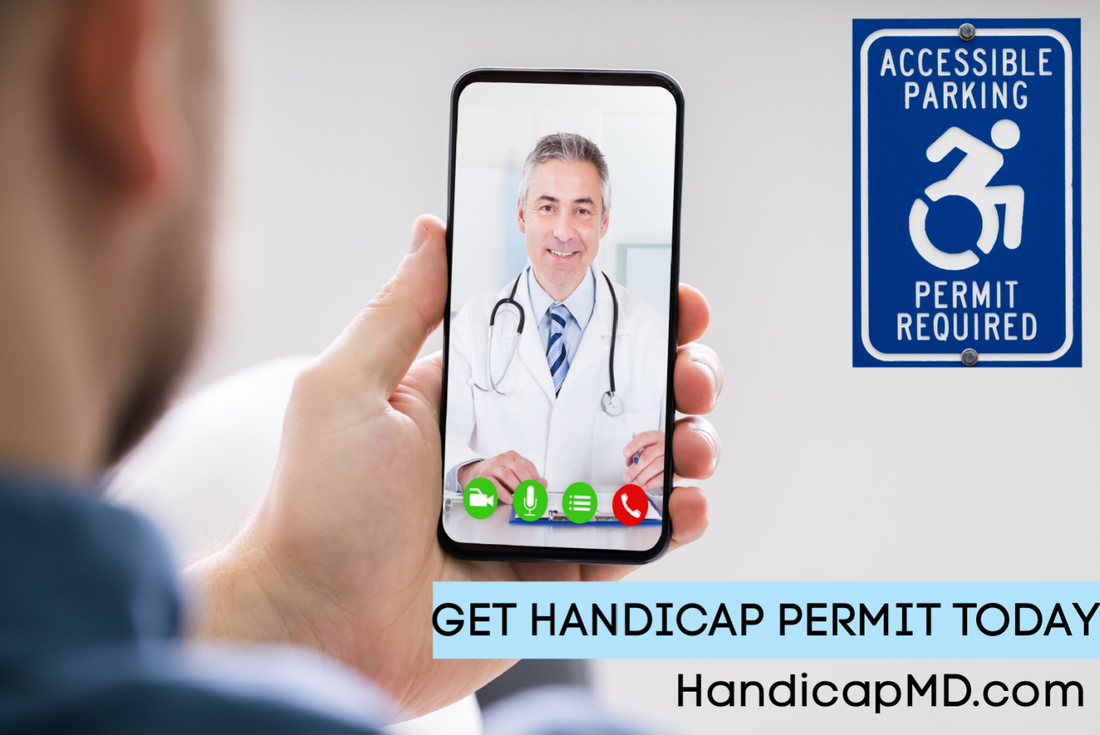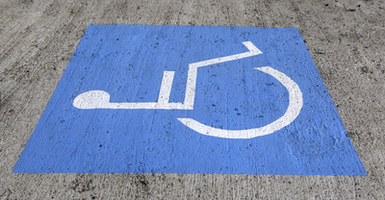
Qualifying Diseases / Conditions / DMV Handicap Permits: Limited Mobility Problems & Getting a DMV Handicap Permit in California
Mobility conditions and DMV handicap permits
Mobility issues affect all aspects of your life. It's difficult to get around. Walking may be painful or exhausting. You may even be in a wheelchair, making it even harder to get from one place to another.
Medical content reviewed by Dr Eric Jackson-Scott MD, Chief Medical Officer
A California handicap parking permit will make life a little easier. Suddenly, you don't have as far to walk or push your wheelchair. You can park by wheelchair ramps and have front row parking a few feet from the building's entrance.
How to Get a DMV Handicap Placard for Mobility Conditions in California
![]()
Almost everyone has a horror story about a visit to the Department of Motor Vehicles. Lines are notoriously long, sometimes snaking outside the door. It can take hours before your number is called, and then you still have to fill out various driver's license forms. Thankfully, the process is simpler for a handicap placard in California.
A handicapped parking lot makes it easy to access the DMV facility. You have easy access to ramps and automatic doors. The counter inside is also specially designed to accommodate disabled motorists.
The lines for a disability sticker or license plate are noticeably shorter. You don't have to give up a day to apply for a disability placard. You will need to fill out a few forms, but the process is quick and simple.
Eligibility for an Accessible Parking Placard for Mobility Conditions - Loss of Vision, MS, Parkinson's Disease, Stroke, Obesity, Arthritis, Brain or Spinal Injuries
Handicap parking requirements are strict. You must meet specific requirements to use a California handicap parking permit. Your mobility condition must make it hard or impossible for you to safely park away from the building's entryway.
Conditions that meet the eligibility requirements are partial or complete vision loss in one or both eyes. Surgery or broken bones in the legs, ankles, or feet are also qualify conditions for handicapped parking.
Medical conditions can also impede mobility which includes multiple sclerosis (MS), Parkinson's disease, and severe obesity, arthritis. Traumatic spine and brain injuries affecting mobility are also excepted reasons why you are applying for a handicap placard.
Parkinson's disease and multiple sclerosis are manageable with medication and physical therapy, but the tremors and loss of muscle control are permanent symptoms. Traumatic spine and brain injuries are most often the results of a sport or motor vehicle accident. The symptoms can vary from tremors to loss of motor function that may be permanent or respond over time to therapy.
These conditions are only manageable with treatment, there is currently not a proven cure. To qualify for handicap parking, you do not need to be diagnosed with an incurable disease. Some mobility conditions are temporary, like broken legs. In this case, you may only qualify for a temporary disability sticker.
Handicap Parking Permits: How to Get One
Start by locating a doctor to fill out your medical certification form. You may be able to fill out the forms online or send them in by mail. You will need your physician's signature on the form, along with a brief description of your condition. It's best to talk to your doctor first. You don't want to wait weeks for your physician to send the forms back.
If your mobility condition is due to the loss of a limb, you do not need a doctor's signature. Your condition is obvious. You will not need to apply in person for the disabled persons parking placard in California, but the process will only take a few minutes.
You also want to decide if you want a placard or license plates. Placards are hung from the rearview mirror or placed in full view on the dashboard. You can switch the placard to different vehicles as needed. License plates are registered to a single-vehicle. You can't change them out between cars. You will need to renew your handicapped permit as well.
How to Apply for a Handicap Parking Permit for Mobility Conditions
Our HandicapMD experts will fill in and sign the Medical Provider’s Form of your application REG 195.
. Don't worry, it's not a booklet. It's a straightforward form asking for your basic information.
You do have to live or at least work full-time in California to meet eligibility requirements. Out-of-state-visitors will not qualify. Your HandicapMD physician, doctor assistance, licensed nurse, or certified midwife must fill out the small section detailing your mobility condition.
Don't forget to have the physician sign the form. It also applies to you. Forgetting the signature will result in your application being denied.
If you are applying for a temporary DMV disability sticker, bring $6. There is a small fee for processing and registering the handicap placard. You won't pay a fee for handicapped license plates. Just bring in your old plates and exchange them for the new ones. You still have to pay annual registration fees.
After you get your handicap permit, keep it clearly visible every time you park in a designated space.
Why You Should Consider a Handicap Parking Permit for Mobility Conditions
Whether you have difficulty walking or are in a wheelchair, making it across an expansive parking lot is exhausting and dangerous. A handicap placard in California lets you park in any spot marked with a wheelchair symbol, and along specific colored curbs. Blue curbs do not have a time limit on how long you can leave your vehicle there, while green painted ones are for short-term parking.
Having front-row parking is a game-changer when you are dealing with mobility issues. It is important to remember the handicap placard does not give you a license to park anywhere. Parking spaces marked with a criss-cross pattern are designated only for vehicles with automatic or manual wheelchair lifts.
You also cannot park at red, yellow, or white painted curbs. These are for emergency vehicles, deliveries, and passenger pickup and drop-offs. You will receive a traffic ticket even though you are displaying your handicapped parking sticker.
Talk to a HandicapMD physician today about getting a handicap parking placard for mobility issues.
| VISION | RESPIRATORY | CARDIAC / HEART |
| MOBILITY | NEUROLOGIC | LIMB LOSS / AMPUTEE |
| ARTHRITIS | OSTEOARTHRITIS | INFLAMMATORY |
.png)






